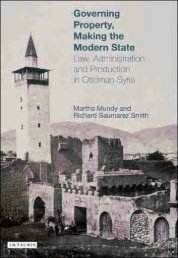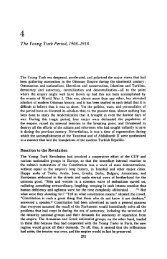Legal borrowing and its impact on Ottoman legal culture in ... - PSI424
Legal borrowing and its impact on Ottoman legal culture in ... - PSI424
Legal borrowing and its impact on Ottoman legal culture in ... - PSI424
You also want an ePaper? Increase the reach of your titles
YUMPU automatically turns print PDFs into web optimized ePapers that Google loves.
AVI RUBIN<br />
Hanım to return 220 kurus¸ to the Treasury. This was not an <strong>in</strong>significant<br />
sum; around the turn of the century, a m<strong>on</strong>thly salary of 540 kurus¸ was<br />
c<strong>on</strong>sidered sufficient to support a small family. 66<br />
The persistent Saide Hanım decided that the judicial battle was not<br />
over. At this po<strong>in</strong>t, she was the <strong>on</strong>e who appealed to the Court of<br />
Cassati<strong>on</strong>. The pla<strong>in</strong>tiff (most probably at the suggesti<strong>on</strong> of her attorney)<br />
changed strategy <str<strong>on</strong>g>and</str<strong>on</strong>g> decided to employ a procedural argument rather<br />
than substantive <strong>on</strong>e. She argued that the Istanbul Court of Appeal<br />
had unlawfully charged her 400 kurus¸ <strong>in</strong> <strong>legal</strong> expenses even though<br />
the sec<strong>on</strong>d trial took place under the order of the Court of Cassati<strong>on</strong>. This<br />
she alleged was a violati<strong>on</strong> of procedure. M<strong>in</strong>or procedural breach though<br />
it was (<str<strong>on</strong>g>and</str<strong>on</strong>g> completely irrelevant to the actual dispute) the Court of<br />
Cassati<strong>on</strong> decided <strong>in</strong> her favour <str<strong>on</strong>g>and</str<strong>on</strong>g> quashed the decisi<strong>on</strong> of the appellate<br />
court altogether <strong>on</strong> the grounds that the latter had unlawfully charged<br />
400 kurus¸ <strong>legal</strong> expenses while it was supposed to charge <strong>on</strong>ly 100 kurus¸.<br />
The outcome of their rul<strong>in</strong>g was that the case returned to the lower court;<br />
unfortunately, we do not know how it ended. 67<br />
The case of Saide Hanım is typical <strong>in</strong> the sense that hundreds of other<br />
decisi<strong>on</strong>s issued by the high court reveal that litigants recognized the value<br />
of procedural arguments <strong>in</strong> appellate courts. It is not as typical, however,<br />
when c<strong>on</strong>sidered <strong>in</strong> socio-ec<strong>on</strong>omic terms. Appeal<strong>in</strong>g a case was a costly<br />
bus<strong>in</strong>ess. First, there was the need for <strong>legal</strong> representati<strong>on</strong>. The fact that<br />
professi<strong>on</strong>al attorneyship was <strong>in</strong>troduced <strong>in</strong>to the <strong>Ottoman</strong> judicial<br />
sphere at the same time as the <strong>in</strong>creas<strong>in</strong>g <strong>legal</strong> <str<strong>on</strong>g>borrow<strong>in</strong>g</str<strong>on</strong>g> <str<strong>on</strong>g>and</str<strong>on</strong>g> the ensu<strong>in</strong>g<br />
crystallizati<strong>on</strong> of an obsessi<strong>on</strong> with procedural law <strong>in</strong> the late 1870s is no<br />
co<strong>in</strong>cidence. Though the c<strong>on</strong>cept of <strong>legal</strong> representati<strong>on</strong> had existed <strong>in</strong><br />
Islamic law, the role of the attorney as a professi<strong>on</strong> regulated by the state<br />
was a novel idea. 68 The complicated procedural battleground rendered<br />
<strong>legal</strong> representati<strong>on</strong> almost <strong>in</strong>dispensable <strong>in</strong> the Nizamiye courtroom <strong>in</strong><br />
general, <str<strong>on</strong>g>and</str<strong>on</strong>g> <strong>in</strong> the appellate courts <strong>in</strong> particular, <str<strong>on</strong>g>and</str<strong>on</strong>g> the costs <strong>in</strong>volved<br />
were significant. The state-regulated tariff for 1879, for example, required<br />
litigants to pay their lawyers 50 kurus¸ for the first 150 words <strong>in</strong> a petiti<strong>on</strong><br />
submitted to a court of appeal or to the Court of Cassati<strong>on</strong>, <str<strong>on</strong>g>and</str<strong>on</strong>g> extra<br />
10 kurus¸ for any additi<strong>on</strong>al 100 words. Each plea <strong>in</strong> court allowed the<br />
attorney to charge his client another 60 kurus¸. 69 Sec<strong>on</strong>dly, there were the<br />
judicial fees. The petiti<strong>on</strong>er had to be able to pay a range of court costs,<br />
from fees <strong>on</strong> <strong>in</strong>itial petiti<strong>on</strong>s <str<strong>on</strong>g>and</str<strong>on</strong>g> notary expenses to fees <strong>on</strong> the executi<strong>on</strong><br />
of judgements. Those who resided <strong>in</strong> faraway places <str<strong>on</strong>g>and</str<strong>on</strong>g> wished to appear<br />
<strong>in</strong> court pers<strong>on</strong>ally rather than by petiti<strong>on</strong> or written resp<strong>on</strong>se had to bear<br />
the heavy costs of the journey to the tribunal. All these amounted to<br />
significant sums of m<strong>on</strong>ey, which meant that appeals were not available<br />
to a c<strong>on</strong>siderable porti<strong>on</strong> of the populati<strong>on</strong>, most notably the poor <str<strong>on</strong>g>and</str<strong>on</strong>g><br />
294












